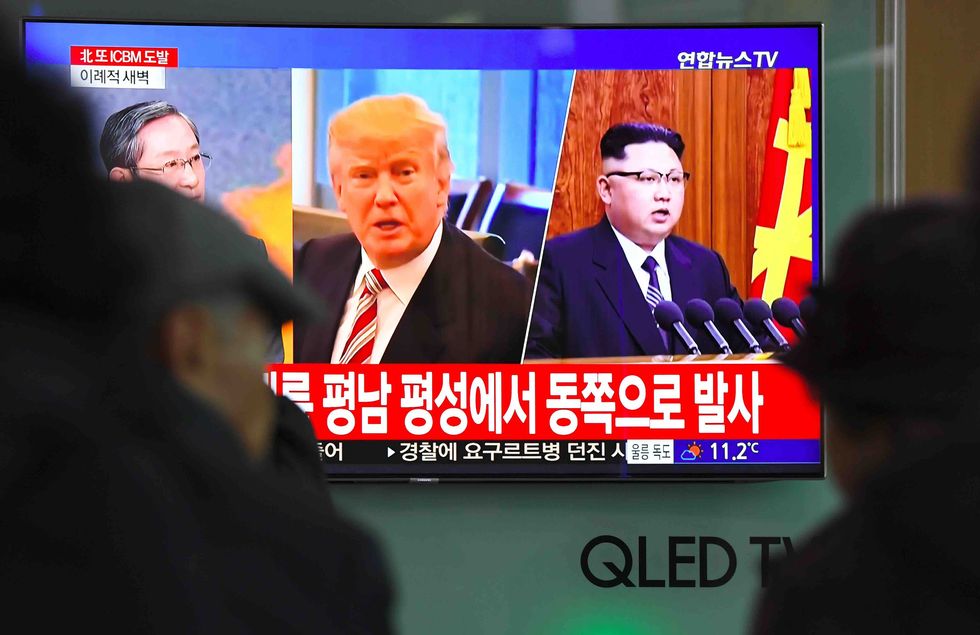
The Donald Trump administration has repeatedly said that "all options are on the table" when it comes to dealing with threats from North Korean President Kim Jong Un and his regime. (Jung Yeon-Je/AFP/Getty Images)

A State Department official said Thursday that the U.S. is not close to taking military action against North Korea, but he stressed that "all options" are still on the table.
U.S. special envoy Joseph Yun said that the U.S. continues to seek a peaceful resolution to the current nuclear standoff with the Hermit Kingdom, despite North Korean President Kim Jong Un's repeated moves to antagonize the West.
Yun told reporters Thursday in Japan that "all options are on the table" when it comes to pressuring North Korea, Reuters reported. But he added that he did not believe military action was close to being taken.
"Our policy is very much for the peaceful resolution of the North Korean nuclear crisis. We've said over and over again that what we want to see is dialogue," Yun said, according to Reuters. "Having said that, we also have said that all options are on the table, and by all options, it has to include military options."
"I don't believe we are close to it," he added, referring to military action.
Yun's comments came about a day after President Donald Trump criticized the "depraved" North Korean government during the State of the Union address Tuesday night and vowed to fight the nuclear threat posed by the regime.
Trump said that Kim's treatment of his own people should tell the world to take Kim's threats seriously:
No regime has oppressed its own citizens more totally or brutally than the cruel dictatorship in North Korea.North Korea's reckless pursuit of nuclear missiles could very soon threaten our homeland. We are waging a campaign of maximum pressure to prevent that from happening.
Past experience has taught us that complacency and concessions only invite aggression and provocation. I will not repeat the mistakes of past administrations that got us into this very dangerous position.
We need only look at the depraved character of the North Korean regime to understand the nature of the nuclear threat it could pose to America and to our allies.
The Kim regime has repeatedly refused to cease its nuclear weapons program and has continued to develop and test ballistic missiles.
Recent North Korean missile tests, including one that was fired over U.S. ally Japan, have shown that the communist nation is capable of striking the United States.
Reports last summer also revealed that Kim's government has developed a miniature nuclear warhead small enough to fit inside an intercontinental ballistic missile.
Last year, as the world began to truly understand the seriousness of the North Korean threat, Trump's national security adviser, H.R. McMaster, told radio host Hugh Hewitt that the administration would not tolerate a nuclear North Korea, and added that a "preventive war" was still an option:
Hewitt: Are we looking at a preemptive strike? Are you trying to prepare us, you being collectively, the administration and people like Lindsey Graham and Tom Cotton for a first strike North Korea?McMaster: Well, we really, what you’re asking is — is are we preparing plans for a preventive war, right? A war that would prevent North Korea from threatening the United States with a nuclear weapon. And the president’s been very clear about it. He said, “He’s not gonna tolerate North Korea being able to threaten the United States” if they have nuclear weapons that can threaten the United States; It’s intolerable from the president’s perspective. So of course, we have to provide all options to do that. And that includes a military option.
In January, officials from North and South Korea began talks that South Korean leaders hoped would begin to ease tensions. The discussions resulted in an agreement to have the two nations march under a unified flag at the 2018 Winter Olympics in Pyeongchang, South Korea. The South Korean Unification Ministry stated at the time that the longterm goal is to resolve tensions enflamed by the North's actions.
Following the initial round of talks, South Korean President Moon Jae-in commended President Trump for his role in the initial thawing of inter-Korean relations.
Yun told reporters that the administration welcomed the North-South dialogue and that he hoped it was a sign of things to come, Reuters reported. However, he added that any talks that include Washington would have to "be about steps North Korea would take toward denuclearization."